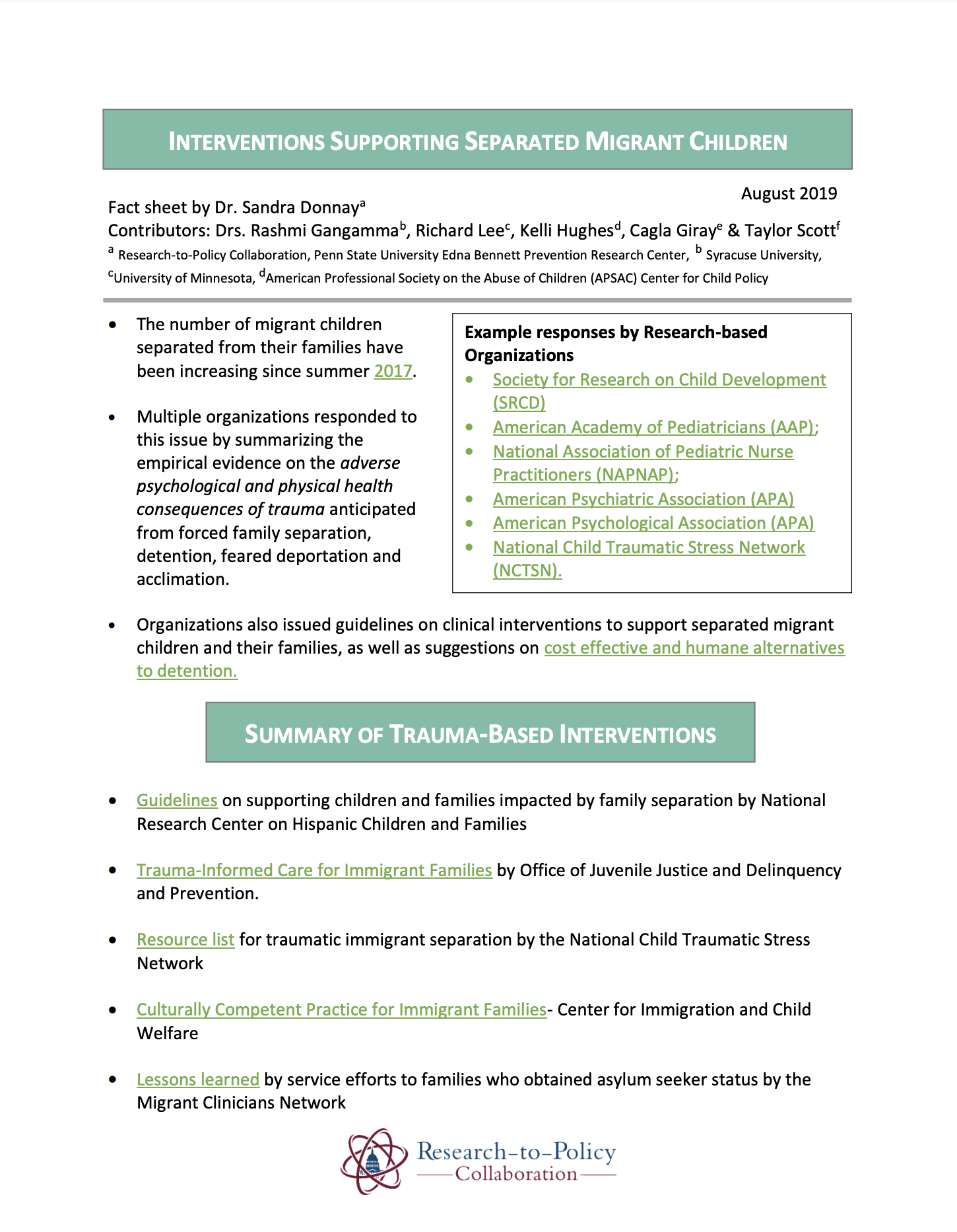
- The number of migrant children separated from their families have been increasing since summer 2017.
- Multiple organizations responded to this issue by summarizing the empirical evidence on the adverse psychological and physical health consequences of trauma anticipated from forced family separation, detention, feared deportation and acclimation.
- Organizations also issued guidelines on clinical interventions to support separated migrant children and their families, as well as suggestions on cost effective and humane alternatives to detention.
Example Responses by Research-based Organizations
- American Academy of Pediatricians (AAP)
- American Psychiatric Association (APA)
- American Psychological Association (APA)
- National Association of Pediatric Nurse Practitioners (NAPNAP)
- National Child Traumatic Stress Network (NCTSN)
- Society for Research on Child Development (SRCD)
Summary of Trauma-based Interventions
- Guidelines on supporting children and families impacted by family separation by National Research Center on Hispanic Children and Families
- Trauma-Informed Care for Immigrant Families by Office of Juvenile Justice and Delinquency and Prevention.
- Resource list for traumatic immigrant separation by the National Child Traumatic Stress Network
- Culturally Competent Practice for Immigrant Families– Center for Immigration and Child Welfare
- Lessons learned by service efforts to families who obtained asylum seeker status by the Migrant Clinicians Network
The Research-to-Policy Collaboration (RPC) works to bring together research professionals and public officials to support evidence-based policy. Please visit their website to learn more.
Key Information
RPC Website
Research-to-Policy Collaboration
Publication DateAugust 1, 2019
Topic Area(s)Social Services, Community-Specific
Resource TypeWritten Briefs
Share This Page
- The number of migrant children separated from their families have been increasing since summer 2017.
- Multiple organizations responded to this issue by summarizing the empirical evidence on the adverse psychological and physical health consequences of trauma anticipated from forced family separation, detention, feared deportation and acclimation.
- Organizations also issued guidelines on clinical interventions to support separated migrant children and their families, as well as suggestions on cost effective and humane alternatives to detention.
Example Responses by Research-based Organizations
- American Academy of Pediatricians (AAP)
- American Psychiatric Association (APA)
- American Psychological Association (APA)
- National Association of Pediatric Nurse Practitioners (NAPNAP)
- National Child Traumatic Stress Network (NCTSN)
- Society for Research on Child Development (SRCD)
Summary of Trauma-based Interventions
- Guidelines on supporting children and families impacted by family separation by National Research Center on Hispanic Children and Families
- Trauma-Informed Care for Immigrant Families by Office of Juvenile Justice and Delinquency and Prevention.
- Resource list for traumatic immigrant separation by the National Child Traumatic Stress Network
- Culturally Competent Practice for Immigrant Families– Center for Immigration and Child Welfare
- Lessons learned by service efforts to families who obtained asylum seeker status by the Migrant Clinicians Network
The Research-to-Policy Collaboration (RPC) works to bring together research professionals and public officials to support evidence-based policy. Please visit their website to learn more.

Key Information
RPC Website
Research-to-Policy Collaboration
Publication DateAugust 1, 2019
Topic Area(s)Social Services, Community-Specific
Resource TypeWritten Briefs
Share This Page
LET’S STAY IN TOUCH
Join the Evidence-to-Impact Mailing List
Keep up to date with the latest resources, events, and news from the EIC.




